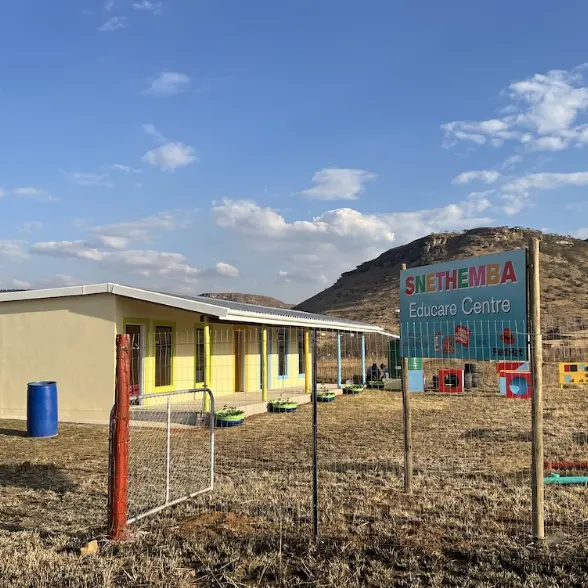From ABCs to ROI
Why SA corporates should invest in early childhood development
South African companies spent an estimated R11.8 billion on corporate social investment (CSI) during the 2023 financial year – a mere 1% increase in real terms on the R10.9 billion spent in 2022. Now, ahead of the new financial year, businesses should not only be planning how to increase their CSI budgets but also where to spend these for the greatest impact, especially with more Government belt- tightening expected in the upcoming Budget Speech.
This is according to Deb Zelezniak, CEO at the Santa Shoebox Project who says, “I am pleased to note that last year, the bulk of CSI spend was on education. However, only 26% of this went towards early childhood development (ECD) while 43% was devoted to school-level education and 27% to tertiary education. What corporates might not realise is that ECD lays the foundations for success in these next stages of education. Studies show that children who participate in quality ECD programmes not only achieve better in school but are also more likely to attend university.”
Government ECD funding falls short
She adds that businesses could also be unaware that the bulk of Government funding is spent on children in grade R rather than those in ECD programmes. “Moreover, the meagre amount that they do spend on ECD will now be reduced. Despite the 3.1% nominal increase in basic education funding announced in the last Medium Term Budget Policy Statement, this actually translates to a 1.4% reduction when CPI inflation is factored in.”
“If Treasury reduces ECD funding even further, it will mean that access to and the quality of ECD services will remain a challenge, with socio-economically vulnerable children being at the greatest disadvantage,” Zelezniak points out. “Currently, more than 1.3 million children aged between three and five are not yet attending any form of early learning programme and only 45% of those who do are reaching key milestones, so I am gravely concerned as to how budget cuts could impact the country’s children.”
“While President Ramaphosa stated in his recently delivered State of the Nation Address (SONA) that Government’s focus over the next five years would be on expanding access to ECD, this will be too little too late, unless corporate South Africa steps in now to bridge the funding gap,” she notes.
ROI ripple effects
“Beyond producing positive returns for the child, investment in quality ECD programmes also yields some of the highest rates of return to families, societies, and even the country, with it being estimated that for every Rand invested, South Africa gets at least R10 back. Businesses that invest also benefit from deductions of 10% for donations to approved public benefit organisations (PBOs) under Section 18A of the Income Tax Act, the BroadBased Black Economic Empowerment (B-BBEE) scorecard, and the Employment Tax Incentive (ETI),” explains Zelezniak.
The Santa Shoebox Project is one of these registered PBOs and, as a Level One Contributor to B- BBEE, earns its supporters 135% procurement recognition. The organisation depends on sponsorships and donations to positively impact the lives of underprivileged children throughout South Africa and Namibia.
“Monetary donations are allocated to SSP Legacy which brings permanent change to the lives of Santa Shoebox beneficiary children and the impoverished communities in which they live by establishing new and transforming existing ECD centres in rural South Africa. This also includes registering the centres with the Department of Basic Education, training educators in skills critical to ECD, providing access to potable water and nutrition for growth and development and improving literacy,” outlines Zelezniak.
She concludes by saying, “The future of the country’s children rests in the hands of corporate South Africa. Ultimately, without CSI investment in ECD, we will be unable to create ‘a country in which the same opportunities are available to every child, whether they are born in Sandton, in Mdantsane, in Sekhukhune, in Mitchell’s Plain or in Phoenix’ – as per the President’s SONA wish. I therefore urge businesses to prioritise ECD in their CSI budgets.”
For more information go to : santashoebox.org.za
About the Santa Shoebox Project
Traditional Santa Shoebox: Over the last 19 years, 1 301 508 Santa Shoeboxes, each containing eight specified items of treats and essentials, have been given to underprivileged and socially vulnerable children throughout South Africa and Namibia. From 01 September each year, Santa Shoebox donors choose their beneficiary child/ren by name, age and gender and are given the child’s clothing size. Each personalised shoebox reaches the very child for whom it was pledged.
Virtual Santa Shoebox: These shoeboxes are purchased online by donors and are available year-round, meeting the needs of donors who live too far from drop-off points, are too busy to shop or have health issues. Components are chosen by the donor on the Santa Shoebox website, the shoeboxes are packed by the Santa Shoebox Team and delivered to children attending far-flung rural facilities. A VSS contains the eight specified items, as well as additional items, such as a lunchbox and books, and costs R450 plus an optional delivery fee of R30.
SSP Legacy: All Santa Shoebox Project operating costs are covered by corporate sponsors. Privately donated funds and surplus funds generated by the sale of Virtual Santa Shoeboxes accrue to the SSP Legacy and are used to bring permanent change to the lives of Santa Shoebox beneficiary children and the impoverished communities in which they live. SSP Legacy initiatives have thus far reached more than 125 000 children.
Fiduciary information: As a Level One Contributor to B-BBEE, the Santa Shoebox Project earns 100 points on the generic scorecard, and with Section 18A status, is able to provide a tax-deductible receipt in recognition of donations. The Project is an initiative of the JOG Trust (IT2671/2009). The Trust is registered as a Public Benefit Organisation (PBO-930031301), a Non-Profit Organisation (NPO 102-098) and holds a current ICPR in support of 100% SED compliance.

